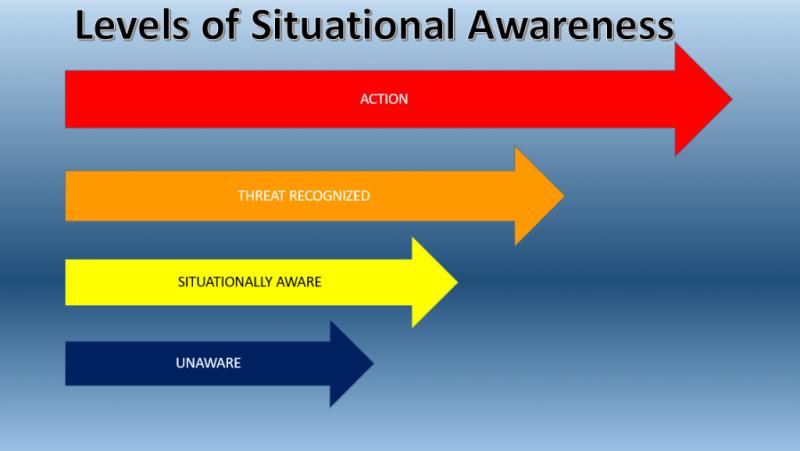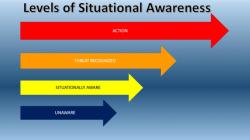How to improve your situational awareness?
Situational awareness is crucial in various aspects of life, including personal safety, decision-making, and effective communication. Here are practical tips to enhance your situational awareness:
1. Stay Present and Mindful:
- Practice mindfulness to stay present in the moment. Avoid distractions and focus on your surroundings.
- Minimize multitasking, especially in situations requiring attention and awareness.
2. Observe Your Environment:
- Continuously scan your surroundings. Be observant of people, objects, and changes in the environment.
- Use your peripheral vision to detect movement and changes outside your immediate focus.
3. Use All Your Senses:
- Engage all your senses to gather information. Listen for sounds, feel changes in temperature or air movement, and be aware of scents.
- Trust your instincts and intuition, as they are often based on subtle cues.
4. Maintain Situational Relevance:
- Assess the relevance of information to your current situation. Prioritize details that are most important to your goals or safety.
- Avoid fixating on irrelevant or distracting elements.
5. Understand Baseline Behavior:
- Familiarize yourself with the normal, baseline behavior of your environment, whether it's a workplace, public space, or social setting.
- Identify anomalies or deviations from the baseline, as they may indicate potential issues.
6. Stay Informed:
- Stay updated on current events, especially those relevant to your location or activities.
- Use reliable sources of information to avoid misinformation.
7. Practice Scenarios:
- Mentally practice various scenarios to enhance your ability to react quickly and effectively.
- Consider different outcomes and plan potential responses in advance.
8. Improve Observation Skills:
- Develop your observational skills by consciously noting details in your environment.
- Consider taking courses or engaging in activities that enhance your observational abilities, such as certain types of training or games.
9. Communicate Effectively:
- Maintain open communication with others. Share observations and information that may be relevant to the situation.
- Encourage others to provide feedback and observations.
10. Assess Personal Factors:
- Be aware of your own mental and physical state. Fatigue, stress, or other personal factors can impact situational awareness.
- Take breaks when needed, prioritize self-care, and ensure you are well-rested.
11. Adaptability and Flexibility:
- Be adaptable and willing to adjust your awareness based on changing circumstances.
- Learn to pivot quickly when unexpected events occur.
12. Seek Training:
- Consider taking situational awareness training courses or workshops.
- Learn from professionals in fields where situational awareness is critical, such as law enforcement or emergency services.
13. Reflect and Learn:
- After events or situations, reflect on your observations and decisions.
- Learn from experiences and continually refine your situational awareness skills.
Enhancing situational awareness is an ongoing process that involves mindfulness, practice, and a commitment to staying informed. Regularly reassess and refine your skills to adapt to different environments and situations.
Sharpening Your Situational Awareness: Seeing the Big Picture in Every Aspect
Situational awareness, the ability to perceive and understand your surroundings, is vital for navigating life's complexities. Here's how to enhance it in various aspects:
1. Techniques for Different Areas:
- Personal safety: Pay attention to people's behavior, exits, and potential hazards. Trust your gut and avoid risky situations.
- Workplace/School: Be aware of colleagues' moods, deadlines, and potential conflicts. Observe nonverbal cues and adapt your communication accordingly.
- Driving: Scan the road, anticipate traffic flow, and avoid distractions. Practice defensive driving techniques and remain alert.
- Social settings: Observe group dynamics, identify potential conflicts, and adjust your behavior to stay comfortable. Engage actively and listen attentively.
- Home/Neighborhood: Be familiar with your surroundings, notice unusual activity, and secure your home. Build relationships with neighbors for support.
2. Practices and Exercises:
- Mindfulness: Practice daily meditation or reflection to enhance focus and observation skills.
- People-watching: Observe people in public spaces and analyze their behavior. Try to guess their motivations or activities.
- Environmental scanning: Take regular, deliberate pauses to scan your surroundings, noting details like exits, potential hazards, or changes in mood.
- Role-playing: Simulate potential scenarios like fire alarms or confrontations to practice responding calmly and effectively.
- Debriefing: After any incident, analyze what went well and what you could have done differently to improve your awareness.
3. Training Programs and Resources:
- Professional training: Look for programs offered by safety organizations, security companies, or law enforcement agencies.
- Online courses: Numerous platforms offer courses on situational awareness for personal or professional use.
- Books and articles: Explore literature on security, safety, and self-defense for valuable insights and real-world examples.
- Community awareness programs: Attend local workshops or talks on crime prevention or neighborhood safety strategies.
Remember:
- Situational awareness is a continuous process, not a one-time achievement. Practice regularly and refine your skills over time.
- Trust your intuition and don't hesitate to act if something feels off.
- Sharing information and experiences with others can enhance your own awareness and theirs.
By actively cultivating your situational awareness, you can navigate life's challenges with greater confidence and preparedness, empowering yourself to handle any situation with a clear, focused mind.
Feel free to ask further questions about specific areas of life or resources you'd like to explore in more detail. I'm here to help you become a master of your surroundings!













